Generations of Change: Climate Perspectives and Justice in Belize
Our Earth has witnessed generations coming and going. Although the lifestyles between generations vary greatly, we all face a common threat: climate change. Each generation has its own perspective on climate change and its ideas about what should be done to achieve climate justice. These ideas range from the simple change in weather patterns to more profound impacts.
I had the opportunity to interview different generations of Belizeans and foreign nationals living in Belize to gain an understanding of how climate change has impacted their lives, their understandings of climate justice, and their recommendations for fostering climate justice within the Belizean community. The meaning of climate change also varies from person to person. Some might think of climate change as merely a change in weather patterns. Others, such as Dr. Kasthuri Henry, see climate change as “the effect of the cancer known as humankind on our Earth.”
A common denominator among these generations is the threat climate change poses to different aspects of their lives. Each interviewee—a high school student, a parent and market vendor, a community empowerment advocate in their 50s, and an elderly person—all see significant changes in weather patterns and increased heat.
The rising temperatures in Belize are nothing new. Dorothy Jean Wade, a resident of Corozal, stated during her interview that over her eighty-nine years of life in Belize, she has seen how the country has become drier. She specifically noted that in the late weeks of May and early June, which she remembers as being rainy in her youth, there is now a lack of rain.
She directly links this to the decreased abundance of crops in Belize. As the daughter of a farmer, she remembers her house being filled to the ceiling with fruit. However, in recent years, she has seen trees in the surrounding villages of Corozal withering away due to lack of rain. The lack of rain and rising heat, she believes, contribute to rising crop prices. Her biggest concern is not just the heat but also the impact that the high cost of fruits and vegetables has on the younger generation. With increased prices, crops become less accessible to the public, which in turn impacts the nutrition of children in families.
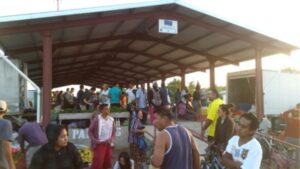
Corozal Farmer’s Market Source: Corozal Live
Today’s youth have similar concerns about their future. J.W., a high school student at Sacred Heart College, expressed serious concerns about her future. Her concerns stem from the fact that she has no idea what climate justice is, which she sees as an injustice. Her understanding of climate change is the changing weather patterns that affect the Earth’s inhabitants.
As our climate is changing, so should our people and our education systems. Youths wish for more climate-related topics to be included in their curriculum. In Belize, students are among the most affected by the heat waves over the past weeks. Due to poor infrastructural design of buildings, students at Sacred Heart College are pursuing their education in classrooms that can be compared to ovens.
This has affected students’ health both physically and mentally, causing rashes, anxiety, and increased stress. Students are so focused on finding ways to cope with the heat that they cannot concentrate on their lessons. In addition, due to the unbearable heat, teachers are often forced to give free periods, which delays students’ education. Both teachers and students are frustrated by the heat, which strains student-teacher interactions.
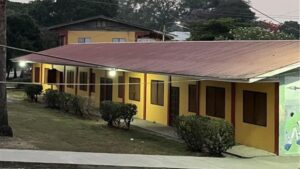
Sacred Heart College Classrooms
J.W. is concerned about how this hindrance to their education will affect their future career opportunities. Adaptation strategies need to be implemented nationwide to ensure that students receive the education they deserve. Most importantly, she encourages students to speak up about their right to an education in a comfortable setting. We should voice our concerns and work on solutions together.
Of course, as a society, it is no single nation’s fault or one person’s duty to combat the effects of climate change on crops and education. Dr. Henry touches on the topic of taking accountability and responsibility toward the environment. We must all consider ourselves caretakers of the Earth. Dr. Henry works in rural communities, teaching children about gardening, pickling, bottling, and integrating these skills into family life. She believes in promoting a connection with nature and understanding its wealth through hands-on learning and sustainability practices.
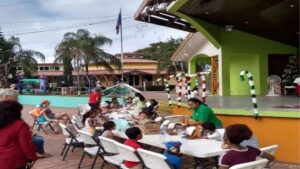
Recycling plastic to make Christmas ornaments – an initiative with Dr. Kasthuri Henry, the Ministry of Sustainable Development, Climate Change and Disaster Risk Management and Minister Orlando Habet’s Team.
The term “climate justice” exists because we have been using resources unjustly. To move toward a more equal society, we need to break the cycles of neglect that have been placed on our environment, with an emphasis on teaching youth, supporting teachers, and empowering creative problem solvers. Apart from showing up, we must be consistent and persevere when faced with resistance.
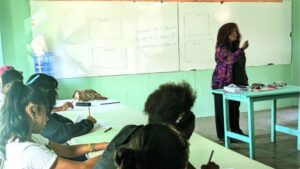
Emotional Intelligence – Summer Youth Leadership Camp at St. Ignatius High School
The perspectives on climate change and climate justice from various generations in Belize underscore the urgent need for collective action and education. It is evident that climate change is not just an environmental issue but a social and economic one that impacts food security, health and education. By fostering a deeper connection with nature, promoting sustainable practice and integrating climate education into our curricula we can empower the next generation to take informed and effective action. Together, we can create a more just and sustainable future for Belize and beyond.
by Anwar Wade
This story was published with the support of the Caribbean Climate Justice Journalism Fellowship, which is a joint venture of Climate Tracker and Open Society Foundations.





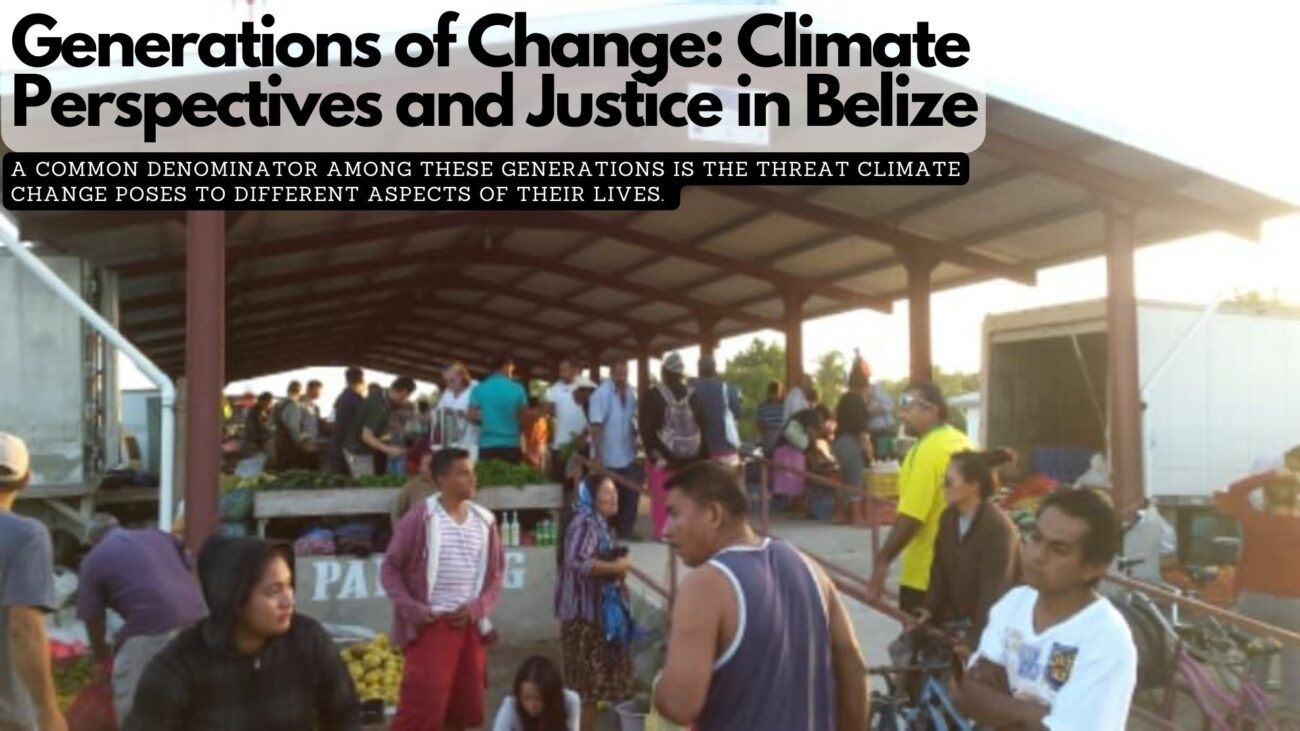

Facebook Comments